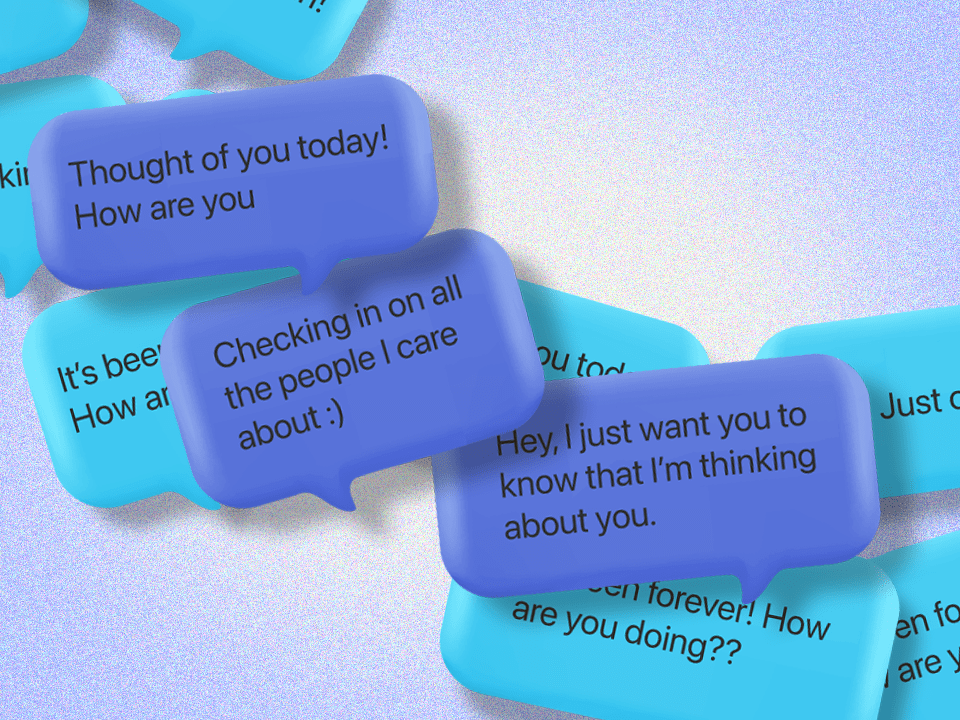Friendship is a beautiful bond that comes with its share of ups and downs. When we notice a friend acting differently, it’s natural to want to check in on them. However, there’s a fine line between showing support and unintentionally pressuring them. In this post, we’ll explore gentle ways to reach out and ensure our friends feel cared for without feeling overwhelmed.
Understanding the Importance of Checking In

Checking in on a friend is more than just a casual text or an occasional phone call. It’s an essential part of nurturing a healthy friendship. Here’s why taking the time to connect is crucial:
- Shows You Care: A simple message or call can mean the world to someone feeling low. It reminds them they are important and not alone.
- Builds Trust: Regular check-ins help create a bond of trust. Friends who feel supported are more likely to open up and share their feelings.
- Encourages Reflection: Sometimes, we all need a moment to pause and evaluate our emotional state. A gentle nudge from a friend can encourage introspection and personal growth.
- Identifies Changes: Regular interactions allow you to spot changes in your friend’s behavior or mood, which could indicate they need additional support.
So, how do we navigate this sensitive territory? Here are some tips to help you approach your friend’s well-being without pressure:
Be Mindful of Timing
Timing can be everything. Reaching out after a significant event in their life, like a breakup or job loss, can be useful. However, be cautious not to overwhelm them with your concern during emotionally charged moments.
Use Open-Ended Questions
Instead of asking, “Are you okay?” which can make them feel cornered, try asking, “How have you been feeling lately?” This gives them the space to open up if they choose to without feeling pressured.
Offer Support without Strings Attached
Make sure your friend knows you're there for them no matter what. Phrases like, “I’m here whenever you want to talk,” can convey support without obligation. It’s essential to ensure they know they can share at their own pace.
Encourage Activities Together
Sometimes, a change of scenery or a fun activity can lift someone’s spirits. Offer to hang out, whether it’s going for a walk, grabbing coffee, or engaging in a shared hobby. Just being there can provide comfort.
Checking in on a friend’s well-being is a delicate but vital practice. By approaching the topic gently and thoughtfully, you can create a safe space for your friend to share their thoughts and feelings when they are ready. A little kindness can go a long way in strengthening the bonds of friendship.
Also Read This: Common Alternatives to Saying "Are You Okay?" in Conversations
3. Signs Your Friend May Need Support

It can sometimes be tricky to know when a friend might be struggling. Some people are really good at masking what they’re going through, while others may show their feelings more openly. Here are some signs to look out for that might indicate your friend needs a little extra support:
- Changes in Communication: If your friend has gone quiet or is replying to texts and calls less frequently than before, it could be a sign they’re dealing with something difficult.
- Uncharacteristic Behavior: Pay attention if your friend starts acting differently—maybe they’ve become more irritable, withdrawn, or even overly emotional. Changes in routine can say a lot.
- Physical Signs: Sometimes emotions manifest physically. Look for signs of fatigue, noticeable weight gain or loss, or changes in personal hygiene. These may indicate that they’re struggling internally.
- Expressing Feelings: If your friend often expresses feelings of sadness, hopelessness, or anxiety, it’s essential to check in. Listen closely to what they’re saying and how they’re saying it.
- Avoiding Social Activities: Has your friend canceled plans more often or shown a lack of interest in activities they once enjoyed? This can be a red flag and a prompt to reach out.
Remember, these signs don’t automatically mean your friend is in crisis; they might be going through a tough period. The important thing is to be aware and ready to lend a listening ear or shoulder when needed.
Also Read This: A Beginner’s Guide to OK.ru’s Video-On-Demand Feature and How to Use It
4. Choosing the Right Time and Place to Ask

Now that you’ve recognized potential signs that your friend might need some support, the next step is to find the right moment to reach out. Picking the right time and place can make a world of difference in how your friend receives your concern.
First, consider your friend's daily routine. Are they usually busy during work hours? Are weekends better for them? Finding a tranquil moment when they’re likely to be less stressed can help. A calm environment where they feel safe to talk is essential. Here are some tips for choosing the best time and place:
- Private and Comfortable Setting: Look for a quiet café, a park bench, or even a walk around the neighborhood. The goal is to create an atmosphere where they feel comfortable talking without interruptions.
- A Natural Opportunity: Sometimes, checking in can happen organically. If you're hanging out and a moment arises where your friend seems a bit low, that could be the perfect time to gently ask how they’re doing.
- Timing is Key: Avoid bringing it up during stressful or busy times. If they’re rushing to meet a deadline or dealing with a family emergency, they may not be in the right headspace to open up.
- Be Mindful of Their Mood: If your friend seems particularly withdrawn or upset, it might be worthwhile to check in without pressure. Let them know you care without forcing the conversation.
Ultimately, be genuine in your approach. Let them know you’ve noticed they seem a bit off and that you’re there if they want to talk. This way, it feels more like a caring gesture rather than an interrogation. Even if the timing isn’t right, expressing that you’re there for them can provide comfort!
Also Read This: How to Support a Friend by Asking the Right Questions About Their Well-Being
5. How to Approach the Conversation Calmly

Starting a conversation about a friend's well-being can feel intimidating. You want to be supportive but also avoid coming off as intrusive or overwhelming. The key is to approach the conversation with calmness and empathy. Here are some strategies to consider:
- Choose the Right Environment: Opt for a comfortable and private setting. Whether it's a cozy corner at your favorite café or a walk in the park, being in a relaxed environment can make the conversation feel less daunting.
- Be Mindful of Timing: Timing can play a crucial role in how a conversation unfolds. Pay attention to cues indicating whether your friend is in a good space to talk. If they seem busy or distracted, it might be better to wait for a more receptive moment.
- Stay Calm Yourself: Your own demeanor can impact how the conversation flows. Take a deep breath, maintain an open posture, and speak in a gentle tone. This can help put your friend at ease and encourage them to open up.
- Express Genuine Concern: Let your friend know that you care about their well-being. A simple statement like, "I’ve noticed you haven't seemed quite yourself lately, and I just want to check in on you," can demonstrate your support without feeling pushy.
- Listen More Than You Speak: Make it clear that your primary goal is to listen. Encourage them to share without feeling the need to jump in with advice unless they ask for it. Sometimes the best thing you can do is simply provide a safe space for them to talk.
By creating a calm atmosphere and approaching the conversation thoughtfully, you're setting the stage for an open, honest dialogue. It’s all about making your friend feel safe and supported, which can lead to a more meaningful conversation about their well-being.
Also Read This: How to Use OK.ru for Team Projects and Collaborative Work Easily
6. Questions to Consider When Asking if They Are Okay
Once you're in a comfortable space to talk, it's important to ask questions that encourage openness. Here are some gentle, thoughtful questions you might consider:
- “How have you been feeling lately?” – A straightforward yet open-ended question can help your friend share as much or as little as they’d like.
- “Is there anything on your mind that you’d like to talk about?” – This shows you are available to listen while allowing them to guide the conversation.
- “I’ve noticed you seem a bit distant lately; should we talk?” – Framing it as an observation can help your friend feel seen but not judged.
- “What’s been going well for you?” – This question can invite positivity and provide a balanced conversation, encouraging them to share both challenges and joys.
- “Do you need anything from me?” – Offering your support explicitly can invite your friend to express their needs without feeling like they’re a burden.
Remember, the aim is to foster a space for them to share only what they feel comfortable with. Listen actively and respect their boundaries. This gentle approach reaffirms that you care and are there for them, no matter what they’re going through.
Also Read This: Why OK.ru Is an Essential Platform for Small Business Owners
7. Respecting Their Space and Responses
When you’re concerned about a friend’s well-being, it’s natural to want to be there for them. However, it's crucial to remember that sometimes, the best way to show support is by respecting their personal space and how they choose to respond. Everyone deals with their emotions differently, and your friend may not be ready for an in-depth conversation right away.
Here are a few tips to help you navigate this sensitive area:
- Give Them Time: If your friend seems distant or unresponsive, it might not be the best time to press for details. Allow them the space they need to process their feelings.
- Pay Attention to Cues: If they engage in a conversation about their feelings, even in a roundabout way, it’s a good indicator they might want to open up. If they seem uninterested or change the topic, it’s a sign to back off.
- Be Understanding: Everyone has different comfort levels when it comes to sharing personal struggles. Some might prefer to keep things private while others openly discuss their feelings. Respecting their boundaries is crucial.
- Acknowledge Their Feelings: If they do share, validate their emotions without pushing them to elaborate further. Simple affirmations like, “That sounds tough; I’m here for you,” can go a long way.
It’s important to remind yourself that being there doesn’t always mean having to talk. Sometimes, just being in their presence or checking in occasionally can be enough. Your friend is likely to appreciate your patience and continued support, even if they are not ready to engage in deeper conversations.
Also Read This: Why OK.ru’s Video Library Is One of Its Most Exciting Features
8. Offering Support Without Overstepping
Finding the balance between being supportive and not overstepping boundaries can be tricky. You want to express your concern without making your friend feel overwhelmed or pressured to share more than they’re comfortable with. Here’s how to navigate this space with care:
Start with casual check-ins. A simple text or quick call saying, “Hey! Just thinking about you. If you want to chat or hang out, I’m here,” keeps the door open without putting pressure on them. Here are some additional strategies:
- Offer Specific Help: Instead of a generic “Let me know if you need anything,” suggest specific ways you can help, such as, “I’m going grocery shopping later; do you need anything?”
- Engage in Activities: Sometimes engaging in a shared hobby can provide a perfect opportunity for them to open up. Be it watching a movie, going for a walk, or doing a puzzle together, these activities can create a relaxed atmosphere where conversation can flow naturally.
- Be a Good Listener: If they do choose to open up, make sure to listen actively. Avoid jumping in with your own experiences or solutions unless they ask for advice. Sometimes, simply listening is the most powerful support.
- Check in without Intrusion: Sending periodic messages that don’t demand a response can also be an effective way to let them know you care. A simple meme or a funny story can lighten their mood without putting pressure on them to engage deeply.
Ultimately, showing that you care without overstepping shows maturity and respect for your friend’s boundaries. Remember, it’s perfectly okay for them to be working through things at their own pace, and your support can mean the world to them, even if it feels subtle.
Also Read This: Subtle Approaches to Check on Someone Without Directly Asking If They’re Okay
9. Follow-Up Actions After the Conversation
So, you’ve had that initial heart-to-heart with your friend. Well done, you! It's not always easy to reach out, and the fact that you've opened that line of communication is commendable. But what comes next? How can you reinforce your support without overwhelming them? Here are some gentle follow-up actions to consider:
- Check In Regularly: A quick text or a short call can show that you care without being intrusive. You might say something like, "Just checking in! Hope you’re doing okay." This keeps the communication lines open.
- Invite Them to Low-Key Activities: Sometimes, a simple invitation to join you for a casual coffee or a walk in the park can make a world of difference. It provides an opportunity for your friend to talk (or not talk) in a relaxed environment.
- Be Available: Let them know you’re there for them. A straightforward “I’m here whenever you need someone to talk to” goes a long way. Sometimes just knowing someone is in their corner can lift a heavy weight off their shoulders.
- Respect Their Space: If you noticed that they might need some time alone after your conversation, give them that space. Checking in too frequently can feel overwhelming. It's a balancing act, but trust your instincts!
- Encourage Professional Help: If your friend seems particularly troubled and it feels appropriate, gently suggest they consider talking to a professional. You might say, "I think it could really help to talk to someone who can provide support." Always frame it positively.
Following up shouldn't feel like an obligation or an interrogation; rather, it should be about maintaining a supportive presence in their life. Your willingness to be their friend, to be patient, and to listen, can truly help them feel less alone in whatever they're going through.
10. Conclusion: Building a Supportive Friendship
At the end of the day, nurturing a supportive friendship is about being authentic and present. Remember that friendships grow through both joyful times and challenging moments. Here are some key takeaways for building that supportive bond:
- Be Attentive: Pay attention to changes in your friend's behavior or mood. Sometimes the smallest changes can indicate they might be struggling.
- Listen Actively: When they do open up, practice active listening. This means not just hearing their words but truly understanding their feelings and experiences.
- Offer Comfort, Not Solutions: Often, friends just need someone to lean on rather than someone who tries to "fix" the problem. A listening ear is often more powerful than advice.
- Foster Trust: Build a foundation of trust by being reliable, keeping confidences, and showing that you genuinely care about their well-being.
- Celebrate Small Wins: Acknowledge any positive steps they take, no matter how small. Celebrating milestones can help reduce feelings of loneliness or inadequacy.
Remember, every friendship is unique. Adjust your approach based on your friend’s personality and preferences. The most important thing is to show that you care. In building a supportive friendship, you not only contribute to your friend's well-being but also enrich your own life. The bonds we create through understanding, patience, and love are what make our lives truly meaningful.
 admin
admin








